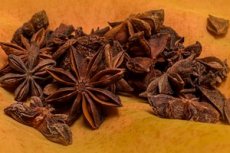Medical expert of the article
New publications
Preparations
Anise from a cough in the bronchi
Last reviewed: 23.04.2024

All iLive content is medically reviewed or fact checked to ensure as much factual accuracy as possible.
We have strict sourcing guidelines and only link to reputable media sites, academic research institutions and, whenever possible, medically peer reviewed studies. Note that the numbers in parentheses ([1], [2], etc.) are clickable links to these studies.
If you feel that any of our content is inaccurate, out-of-date, or otherwise questionable, please select it and press Ctrl + Enter.

Anise is one of the many plants that has been used since ancient times in the treatment of cough and bronchitis, thanks to the ability of the herb to stimulate sputum and to relieve inflammation on the bronchial mucosa. Formulations based on anise in childhood also treated many of us, and we can apply prescriptions to treat their babies.
Dosing and administration
To combat the cough, anise oil and plant seeds were widely used . Oil is effective in wet cough, while seeds can be used for any kind of cough.
It is easiest to buy aniseed oil in a pharmacy. Take it must not in its purest form, and along with warm water, using no more than 3 drops per 1 tbsp. (those with a blood viscosity increase can take no more than 1 drop of oil per intake, dissolving it not in water, but in milk). It is best to treat with oil before eating. Multiplicity of admission - 3-4 times a day.
Treatment with seeds. Seeds of anise like oil are sold in pharmacies, but this medicinal plant can be grown in its own garden.
Infusion of seeds is prepared from 2 cups of boiling water and 1 tbsp. Seeds of a plant. Insist the composition for at least 20 minutes, after which it is filtered and taken to the destination. With bronchitis, the infusion is drunk on ½ cup 4 times a day. It is better to do this before meals, about 15 minutes before a meal.
To prepare the broth for 1 glass of water take 1 tsp. Seeds. Boil the composition for 5-10 minutes, strain and drink 1 tbsp. 3-4 times a day.
Anise compositions have a sweatshop that will have a positive effect on colds and bronchitis with fever. The course of treatment of anise should be short-lived.
Used in inhalations with bronchitis and anise in the form of essential oil plants. In the composition for inhalation it is enough to add 2-3 drops of oil. If inhalations are done by a nebulizer, you need to remember that oil is incompatible with saline, so it's better to use simple boiled water.
Contraindications
Anise does not have dangerous toxicity, and yet its use is not recommended for hypersensitivity to the plant and its essential oil, kidney diseases, as well as for acute and chronic pathologies of the gastrointestinal tract.
During pregnancy, drugs based on anise can be taken with the permission of the doctor, but in the first 3 months it is better to beware of the treatment of grass.
Children anise-based products are best given from 3 years of age.
 [1]
[1]
Side effects Anise
Anise and especially its oil can cause allergy symptoms, irritation of the gastrointestinal tract, which manifests itself in epigastric pains and nausea, and changes blood viscosity.
 [2]
[2]
Storage conditions
We are interested in harvesting the seeds of a plant, and it is carried out when most of the fruits are in a mature state. You do not need to collect the seeds themselves, they are dried on twigs, which are just cut off. When the stems and dried, previously spread out a thin layer on paper or plywood, the seeds are removed from them and poured for storage in a glass container or cardboard box. Keep raw materials in a dry, cool place for no more than 3 years.
Attention!
To simplify the perception of information, this instruction for use of the drug "Anise from a cough in the bronchi" translated and presented in a special form on the basis of the official instructions for medical use of the drug. Before use read the annotation that came directly to medicines.
Description provided for informational purposes and is not a guide to self-healing. The need for this drug, the purpose of the treatment regimen, methods and dose of the drug is determined solely by the attending physician. Self-medication is dangerous for your health.

